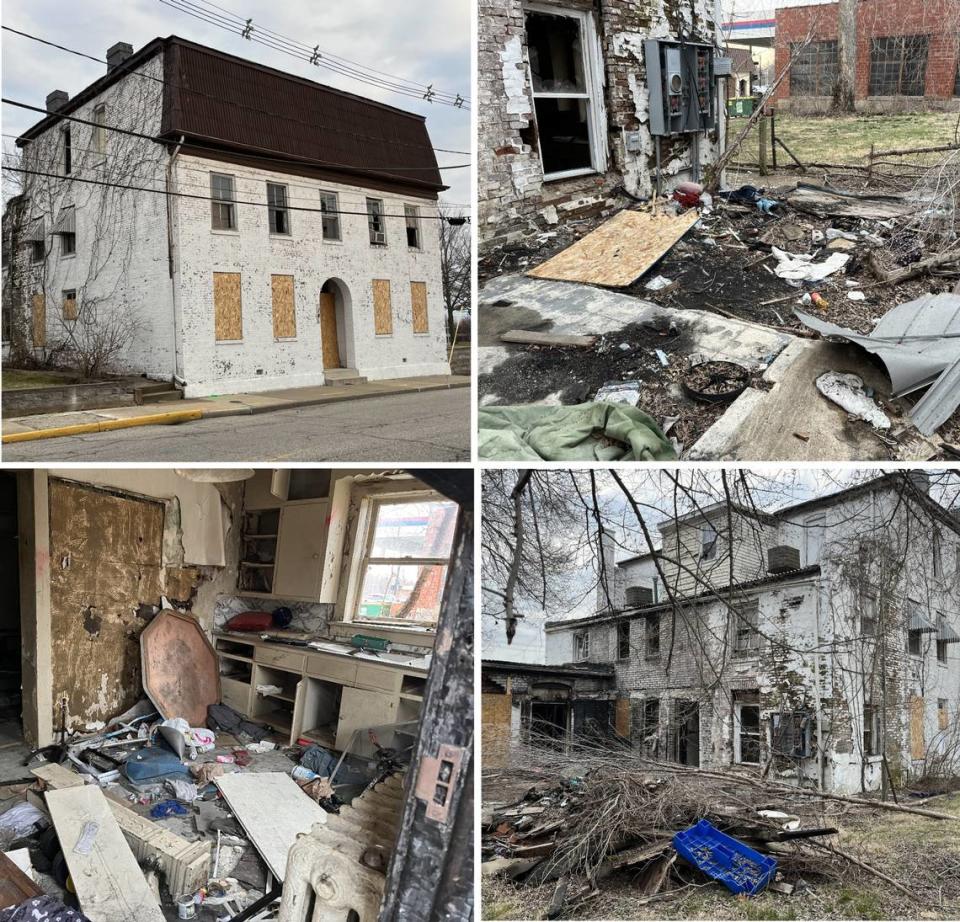City to spend $113,426 to demolish two historic buildings in downtown Belleville
The city of Belleville has demolished about 100 derelict homes and other buildings in the past 12 years, so the process of requesting bids and hiring excavators is nothing new.
But plans for demolition of a three-story brick building at 14 S. Third St. are notable due to the structure’s 150-year-plus history, its deterioration at the hands of an out-of-state investor and the high cost of demolition: $86,226.
“I was shocked (at the cost),” said Scott Tyler, director of health, housing and building. “I’m in the middle of demolishing 13 buildings (mostly homes) right now, and the average cost was $17,500, but I had a trailer in there that was only $7,000, so that brought the average down.”
The City Council approved the $86,226 expenditure at its Monday night meeting in a 16-0 vote.
Aldermen also agreed to spend $27,200 to tear down a second 1800s building at 520 N. Illinois St., where a homeless man’s body was found frozen in a burned-out garage in January.
The Pontoon Beach company S. Shafer Excavations Inc. submitted the combined low bid of $113,426.
“That’s for two buildings?” Ward 4 Alderman Raffi Ovian asked before the vote. City Clerk Jenny Meyer attributed the higher-than-normal cost to their large sizes and poor conditions.
The city doesn’t own the two buildings in downtown Belleville. Both were abandoned by their owners, according to Tyler. Officials went through St. Clair County Circuit Court last year to get them condemned, citing health and safety concerns.
For the past year, city employees have boarded up windows and doors multiple times, but squatters keep pulling off the plywood to gain access, Tyler said. They’ve started fires, destroyed fixtures and filled rooms with trash, debris and buckets of human waste.
The South Third Street building, behind Firestone, originated as a single-family home but later was divided into apartments.
“It’s got structural damage,” Tyler said. “It’s got water damage. They’ve stolen a bunch of electrical wiring, and they’ve taken apart the furnaces for whatever reason. It would be astronomical to repair. I don’t know if it would even be possible. It’d be so much work.”
The two-story brick building on North Illinois Street also originated as a home. The lower level was converted into commercial space, housing a vacuum-cleaner store from 1969 to 1991.
Sam Shafer, owner of the excavating company, estimates that it will be about a month before he can demolish the two buildings.
The one on North Illinois Street will require asbestos removal, he said, but it’s smaller than the South Third Street building, which includes one- and two-story additions behind the main three-story structure.
“We’ve got to work around the electric lines and haul away the bricks and the trash, and then we’ve got to bring in dirt and level the lot off and make it look nice,” Shafer said.

Pattern of abandonment
Demolitions this spring reflect a pattern in which property owners, often investors operating with anonymity as part of limited-liability companies, or LLCs, allow homes and other buildings to deteriorate for years before abandoning them and leaving taxpayers holding the bag.
The city spent about $400,000 on demolitions last year, not including the $730,000 cost of tearing down the old Executive Inn that was covered by funds received from a federal COVID-19 relief bill.
The city is spending nearly $230,000 on the 13 buildings that are now being demolished.
“We file liens on the properties for those costs, and if nobody pays that, like the bank or the owners, then we foreclose on the liens, maybe six months later,” Meyer said last month. “That’s how we’ve acquired a lot of our vacant lots.”
Bob Brunkow, historian for Belleville Historical Society, dates the original part of the South Third Street building back to the 1860s or early 1870s.
St. Clair County records show that the building has changed hands several times, but its current ownership is unclear. It was last sold in 2003 for $75,000 to Milton Moore, described on the deed as a “single person and sole owner” of property at 1013 W. Main St. in Belleville.
However, the West Main Street building was owned by the late Will Weeks and his wife, Julia Weeks, from 1982 until last year, when the county foreclosed due to delinquent taxes, said Whitney Strohmeyer, president of Joseph E. Meyer & Associates, the Edwardsville-based company that serves as its trustee and delinquent-tax agent.
The West Main Street building has been vacant for years. It formerly housed Jamar Properties, a real-estate company for which Will Weeks was treasurer, according to Illinois secretary of state business records. It dissolved in 2016.
“We’re hoping to get that building demolished, too,” Tyler said, noting it’s in bad shape.
Julia Weeks didn’t immediately respond to a request for comment. Luke Allan, who served as president of Jamar Properties 10 years ago, said the company managed the apartment building at 14 S. Third St. for Moore, an Indiana retiree and investor who died in 2022.
Moore began having property tax problems in 2010, falling behind on payments and leading outside investors, including Jamar Properties, to buy his delinquent bills, which were redeemed at one point, Strohmeyer said. No taxes have been paid since 2017.
The county recently started the foreclosure process. The city will have the choice of taking ownership of the vacant lot due to its lien for demolition costs or let it be sold at a tax auction.
“It’s their choice,” Strohmeyer said. “We don’t fight them on anything like that. We try to work in conjunction with them.”

Owned by county sheriff
Brunkow and other local historians have long lamented the demolition of historical buildings in a city known for its 200-year-plus history, including a significant concentration of German-American architecture from the 1800s.
“It really contributes to community amnesia,” Brunkow said. “If you’ve got a building, you can think about who lived there or what happened. But if it’s a vacant lot, it’s harder to ask that question.”
St. Clair County records show that a structure had been built on the South Third Street property by the 1860s and that John Hughes owned a two-story home with 12 rooms at that location before his death in 1873. He served as a county sheriff and judge.
“He was the last person to administer a whipping at the whipping post on the town square,” Brunkow said. “He apparently didn’t like it very much. When he became a state representative, he introduced legislation to end whipping and pillorying in the state.”
His widow, Rebecca Hughes, and son, James Hughes, sold the home for $4,605 to German immigrant George Mueller, who died shortly after.
The home was acquired by his brother, Solomon Mueller, described in his obituary as a farmer and “capitalist,” director of Belleville Gas, Light and Coke and Belleville Horse Railway and vice president of Orbon Stove Co.
“He might have been a scamp,” Brunkow said. “He was found guilty of renting a house to operate a brothel, and he illegally connected two of his houses to the city sewer system.”
Solomon Mueller’s father-in-law, Jacob Moser, owned the South Third Street home for a time before Mueller bought it back, adding a third story with a mansard roof in the 1890s.
The Mueller family lived in the home until 1928 and owned it until 1934, Brunkow said. By that time, it had been converted into apartments.
Over the years, the apartments housed coal miners, grocery clerks, retirees and several single women, including nurses at St. Elizabeth’s Hospital. One prominent tenant was Clara Schoenhofen, secretary-treasurer of Greater Belleville Savings & Loan Co.
“For a time in the 1970s, you see references to the Winker Convalescent Home,” Brunkow said. “I don’t know if it was state-approved. The owner was Florence Winker.”
It was Florence Winker’s descendant, Joe Winker, who sold the building to Milton Moore in 2003, according to county records.
Brunkow believes the building at 520 N. Illinois St. was constructed between the 1870s and the 1890s. Topstone Inv CAH 1, a limited-liability company organized in Missouri, bought it at a county auction for $5,950 in 2020 and paid property taxes in 2021 and 2022.
But in the past year, Topstone has failed to respond to city notices about the structure’s deteriorating condition or court notices regarding condemnation proceedings, officials said.

